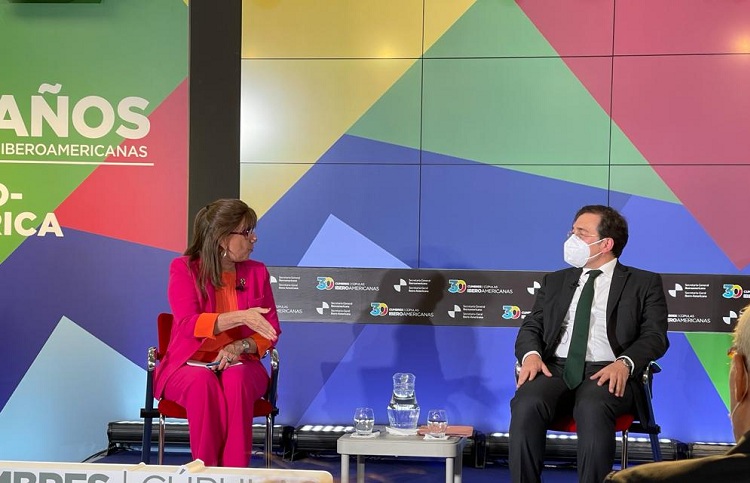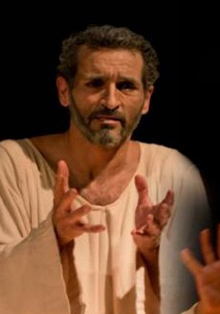Eduardo González
The Minister of Foreign Affairs, José Manuel Albares, assured yesterday before his counterparts from Colombia, Costa Rica, Portugal and the Dominican Republic and before the Ibero-American Secretary General, Rebeca Grynspan, that he has decided to “recover the State Secretariat for Ibero-America” because the region will be “a priority” of his Ministry.
“I wanted my first official action to be this one because I feel deeply Spanish, European and Ibero-American”, said Albares during his speech at the Dialogue of Foreign Ministers organized yesterday by the SEGIB to commemorate the thirtieth anniversary of the first Ibero-American Summit. “That is why the State Secretary for Ibero-America and the Caribbean and Spanish in the World has been recovered, because this has to be made visible”, because “a priority of the Ministry of Foreign Affairs is going to be Ibero-America” and because “Spain cannot be understood in the world without the Ibero-American soul”, he added. The Secretary of State had been incorporated to the Secretary of State for Foreign Affairs by the previous minister, Arancha González Laya.
According to Albares, Ibero-America constitutes “a community, and that is not just any old thing, it involves a set of shared values, objectives and principles”. “We are a family” and over the last thirty years “we have overcome all the crises and differences as a family and we will overcome whatever is necessary,” he continued. Looking to the future, the minister stressed that, at present, the clearest short-term challenge for Ibero-America is the pandemic. “We do not know how long the fight against this tremendous COVID crisis will last” but for this it is necessary to “extend the vaccine” and, therefore, “the commitment of President Pedro Sánchez is to help Latin America with the vaccine”, he said, “You can count on Spain, we will be at your side”, he assured.
In this regard, Rebeca Grynspan urged the entire community to “emulate what Spain has done” when it announced at the recent Ibero-American Summit in Andorra that “when vaccination exceeds 50% of the population, it will begin to send vaccines to Ibero-America”. “That is the most important thing for our countries, because every month of delay is more suffering for our region and a burden for recovery,” warned Grynspan, who is about to leave her post after being appointed secretary general of the United Nations Conference on Trade and Development (UNCTAD).
Other foreign ministers
At the same event, which was held in a hybrid format (face-to-face for Albares and Grynspan and telematic for the rest), the Vice President of the Government and Minister of Foreign Affairs of Colombia, Marta Lucía Ramírez, warned that, in addition to the “common challenge of health”, Ibero-America “has other pandemics, such as poverty, social discontent and inequality”. “We cannot let the pandemic delay the fulfillment of the 2030 Agenda” and, therefore, “the international financial system must respond to our long-term needs,” helping to create infrastructure and new opportunities to achieve “an economic recovery that generates higher incomes for families,” she added.
For his part, the Minister of Foreign Affairs and Worship of Costa Rica, Rodolfo Solano Quirós, said that Ibero-America is on the verge of “a lost generation” due to the unequal access of young people to digital education. He also warned of the “five major threats” facing the region: the pandemic, with special attention to “the large gaps in access to vaccines”; the problems of achieving a “resilient and inclusive green economic recovery”; human mobility and migration, “especially of vulnerable populations”; the degradation of biodiversity and, “the most serious”, the challenges of climate change.
The Portuguese Minister of Foreign Affairs, Augusto Santos Silva, warned in his speech of the need to “maintain the Ibero-American conferences as they are, a space for inclusion in which all countries can intervene so that political debate is always possible”. He also urged to “strengthen the common framework of cooperation in areas of work such as economic cooperation, climate change, digital transformation, university and science”.
Finally (in the order of intervention), the Minister of Foreign Affairs of the Dominican Republic, Roberto Álvarez, insisted on the need to address the great challenges that were the protagonists of the Andorra Summit: financial access to middle-income countries, “as almost all Ibero-American countries are”, a challenge in which “Spain and Portugal can play a very important role”; and universal access to vaccines. “The COVAX mechanism has not worked properly so far” and, therefore, it is necessary to “look for effective, efficient and equitable mechanisms for the distribution of the vaccine,” he said. “Another of the great challenges of the Ibero-American community” is “respect and support for democratic values and human rights, advocating a new approach that allows us to transcend the unfortunate moment in which we find ourselves,” he added, without citing specific cases.
Hymn to Ibero-America
The event concluded with a “surprise”, in Grynspan’s words: the public presentation of the Hymn to Ibero-America by its author, Spanish composer Lucas Vidal. The piece was performed by the Fundación Orquesta y el Coro de la Comunidad de Madrid (ORCAM), but is conceived, she said, to be adapted and “rearranged” by each country with its own “Ibero-American sounds”.







